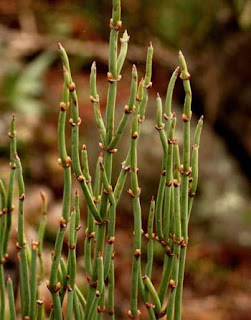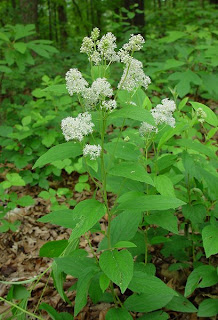EPHEDRA

Latin Name: Ephedra sinica
Alternate Names: Ma Huang
Family: EPHEDRACEAE
Parts Used: Stems, branches.
Properties: Analgesic, Astringent, Bronchial Dilator, Cardiac Stimulant, Circulatory Stimulant, Decongestant, Diaphoretic, Diuretic, Expectorant, Stimulant, Vasoconstrictor.
Internal Uses: Allergies, Arthritis, Asthma, Bronchitis, Cigarette Addiction, Cocaine Addiction, Colds, Hay Fever, Metabolic Stimulant, Obesity
Internal Applications: Tea, Tincture, Capsules.
It brings one's internal energy from the center to the surface, which can leave one depleted at the core. To minimize this effect, Ephedra can be combined with licorice. Ephedra elevates blood pressure and stimulates perspiration, urination and the heart. It has a drying effect which decreases stomach acid and saliva secretion.
Ephedrine and pseudoephedrine mimic the effects of adrenaline, causing similar vasoconstriction of the nasal mucosa, bronchial dilation and cardiac stimulation. This mimicing effect also helps one break cocaine addiction.
It brings one's internal energy from the center to the surface, which can leave one depleted at the core. To minimize this effect, Ephedra can be combined with licorice. Ephedra elevates blood pressure and stimulates perspiration, urination and the heart. It has a drying effect which decreases stomach acid and saliva secretion.
Ephedrine and pseudoephedrine mimic the effects of adrenaline, causing similar vasoconstriction of the nasal mucosa, bronchial dilation and cardiac stimulation. This mimicing effect also helps one break cocaine addiction.
Energetics: Sweet, Pungent, Warm, Dry.
Chemical Constituents: Ephedrine, pseudo-ephredine, N-methyl-ephedrine, N-methyl-pseudo-ephedrine, nor-ephedrine, nor-pseudo-ephedrine.
Contraindications: Should be avoided by weak or debilitated people, those with high blood pressure, heart disease, overactive thyroid, diabetes, prostatitis, hepatitis, weak digestion, glaucoma and insomnia. Concentrated extracts have caused heart palpitations, insomnia, vertigo and anxiety. Can weaken the adrenals if improperly used. Can cause nervousness, hypertension or rashes in some rare cases. Avoid in cases of excess sweating and yin deficiency. Should not be used continuously. Avoid for people using monoamine oxidase inhibitors. This herb should be avoided by pregnant women and children. Do not take after 4:00 pm, or it may cause insomnia.
Dried plant is safer to use than fresh.
Dried plant is safer to use than fresh.
Comments: Ma means 'astringent' and huang means 'yellow' in chinese. Ephedra was used by the guards of Ghengis Kahn's army so that they could stay awake all night and avoid being beheaded if caught dozing. Ephedra has been used by Taoist monks to sharpen awareness.

